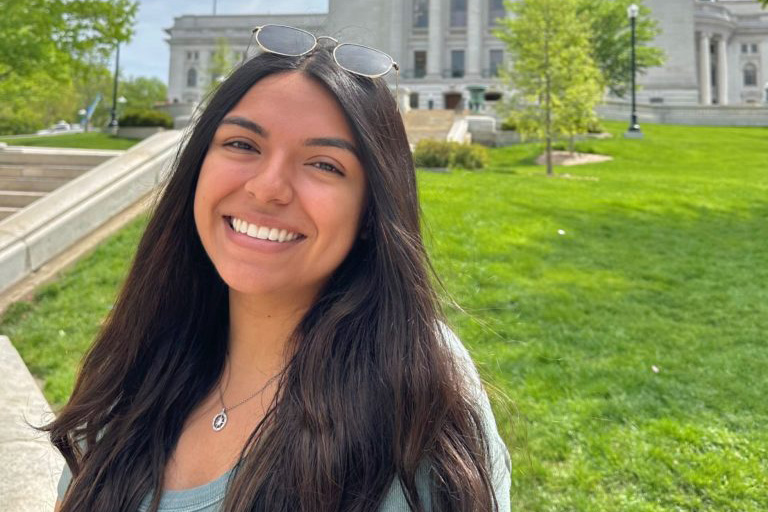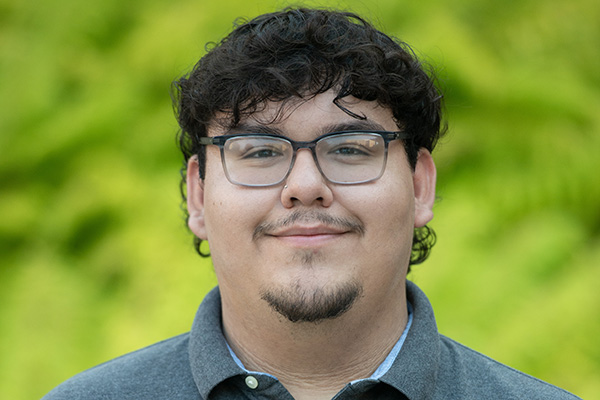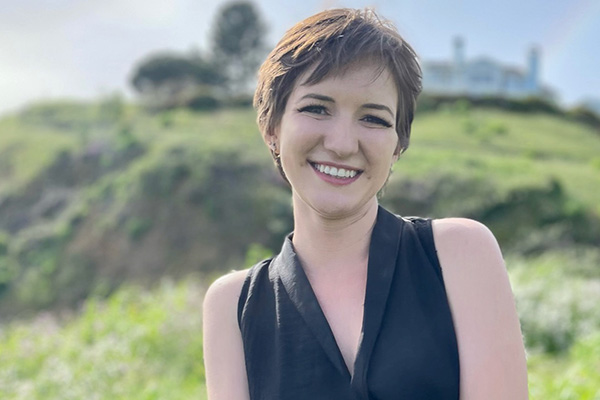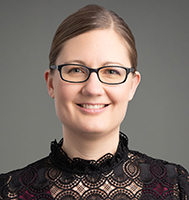Participating in a research group in the Department of Pediatrics can be an enriching and valuable experience for students. Pediatrics research often involves hands-on collaboration across various disciplines, including medicine, biology, psychology, and public health. Engaging in research can broaden your knowledge and provide a more comprehensive understanding of child health issues.
Participating in research projects connects you with professionals and peers in the field of pediatrics. These networking opportunities can be valuable for making connections, accessing future research opportunities, and even securing potential job prospects.
Let researchers in the Department of Pediatrics know that you are interested in pediatrics research by filling out the Student Research Interest Form. The information you provide will be shared with department researchers to connect them with enthusiastic students interested in potential research opportunities. Completing the questionnaire does not guarantee a research position.
Undergraduate Researcher Spotlight

Laura Arroyo: Student Researcher, Mohr Lab
"My research experience has been invaluable to my academic journey! I aspire to attend graduate school and attain my PhD one day, and being under the mentorship of Dr. Emma Mohr has allowed me to learn and grow as a researcher. As a microbiology major, I am interested in infectious diseases, and doing Zika research has allowed me to verify that I want to continue this in graduate school."

Miguel Garcia: Student Researcher, Hospital Medicine and Complex Care Research Group
"Being a part of the Hospital Medicine and Complex Care Research Group helped me to realize that research is not inaccessible. Whenever in doubt, our research group carefully taught us more about qualitative research, gave us grace considering that we were all students, and provided mentorship and solid advice in our own career paths. They helped me realize that one research paper won’t solve the world’s problems, but if we keep chipping away at it, eventually we’ll leave the world a better place."

Tessa Meurer: Student Researcher, Division of Endocrinology and Diabetes
"I care deeply about the research project I am working on and have found great support from the Department of Pediatrics in the time I have been involved. It has definitely influenced my trajectory and interests as a medical trainee as well. In terms of advice, I'd say be open to new opportunities that arise and be proactive in reaching out to professors or research groups that have projects that interest you. You'll never know if you don't ask!"
Get Involved
This is an accordion element with a series of buttons that open and close related content panels.
Explore Your Passions: How to narrow your interests in research
Start by identifying your research interests and academic goals. Explore various fields and topics that intrigue you. Understanding your passion and motivation will help you find the right research group that aligns with your interests. Browse through the division pages and researcher profiles on the Department of Pediatrics website to find topics that interest you. Look for professors whose research areas align with your interests. Take note of their recent publications and ongoing projects.
Attending department seminars, workshops, and research-related events can help you establish connections with current pediatrics researchers. Engage in conversations with professors and students who share similar research interests. Immersing yourself in the established research of your colleagues is a great way to learn about the pioneering work that many undergraduate students are a part of at UW–Madison.
Explore Mentorship Opportunities: How to contact a research group
There are generally two ways to join a research group in the Department of Pediatrics: apply for a posted position on UW Student Jobs or express your interest through our Student Research Interest Form.
Whether you are applying through a UW Student Job listing or using the Student Research Interest Form, craft a well-written message that expresses your interest in joining a research group. Each research group can be found on the research group page on the department’s website. Be clear about your research interests, your academic background, and why you want to work with them specifically. Keep the communication concise, respectful, and professional. Be patient and give them some time to respond.
Update your resume to include relevant coursework, academic achievements, skills, and any previous work experience that is applicable to a research setting. Highlight specific projects or coursework that align with the work taking place in the research group. If a professor or research group shows interest in your application, they might invite you for an interview. You can also directly ask for an informational interview to learn more about their research and discuss your possible involvement. Be prepared to discuss your research interests, academic background, and relevant experiences. Show enthusiasm and curiosity about the research area.
Explore a Research Group: What you might experience as a research group member
Whether you are an undergraduate or a graduate student, joining a research group allows you to work closely with researchers, gain practical skills, and contribute to cutting-edge research. Below are programs, events, and experiences you might be a part of during your time as a research group member.
- Undergraduate research programs. Programs like the Undergraduate Research Scholars (URS) program engage students in research to better understand the practical aspects of conducting research, including experimental design, data collection, analysis, and interpretation. The URS program provides an academic space throughout the year to discuss research across UW–Madison, ethics in research, and overall advice in joining a research group.
- Presenting research. Presenting at UW-sponsored or state-sponsored events is a typical pathway many students undergo. Whether it is presenting your research at Research in the Rotunda, Research Week for the Department of Pediatrics, or at the Undergraduate Research Symposium, there are countless opportunities to show your peers what you have been working on.
- Research in the classroom. Many classes at UW–Madison incorporate the basics of research into the curriculum. BIO152 includes a portion of the class centered around students developing their own meta-analysis project or joining a research group to eventually present their findings within the BIO152 Research Symposium at the end of each academic year.
- Summer medicine programs. Summer programs support learning and research exposure for undergraduate students, including the. Medical Scientist Training Program (MSTP) Summer Scholars and the many options available through the Summer Research Opportunity Program. For first-year medical students, the Shapiro Summer Students engage in basic science, clinical, translational, public health, or health systems projects.
- Grant support. There are many scholarships, grants, and fellowships available to support undergraduate research projects. Scholarships like the Hilldale Undergraduate/Faculty Research Fellowship or the Sophomore Research Fellowship provide the necessary funding to explore your own contribution within the Department of Pediatrics. These opportunities are geared toward individuals who have a clear idea of their research interests and focus and will provide a better connection with their own research endeavors.
Frequently Asked Questions
Can I get paid to do research, or is it only available through academic credit? Many research groups offer hourly paid compensation for your work. A variety of research groups offer the opportunity to work for academic credit at UW–Madison under a “directed study” option to gain college credit while you learn. While some research groups may offer both, others might only be able to provide one option or the other. A great first step is to check out the UW Student Jobs. If you qualify for federal work study under your financial aid package, this may allow for more opportunities to get paid for your contributions in a research group, as it reduces the financial costs for a researcher. If securing a formal research position proves challenging, consider an unpaid position in a research group. This can be an excellent way to gain practical experience and build relationships with potential research mentors.
Is all research conducted in person? There are countless experiences for research within the Department of Pediatrics. Many research groups offer in-person opportunities to conduct hands-on research. Other groups may be more focused on qualitative research, which allows for the possibility of remote work or hybrid models. Research can be catered to your schedule.
Do I need prior experience in research to apply or express my interest in research? No. Research is accessible to a variety of backgrounds. This is a great place to start your research journey or to build upon your previous research background. Your research mentors are happy to help train you and provide you with resources for your success.
Are there opportunities to explore more research and connect with researchers? There are a variety of local, state, or national research symposiums and conferences, typically offered in the spring, to keep you connected with current research.
- Research in the Rotunda (Spring, March)
- Research Week in the Department of Pediatrics (Spring, May)
- Med School Undergraduate Day (Spring, May)
- Undergraduate Research Symposium (Spring, April)
- BIO 152 Research Symposium (Spring, April)
Can I do research outside of my major or academic college? Yes. In fact, engaging in interdisciplinary research can be incredibly valuable and enriching to your academic and professional journey. Conducting research outside of your major can unlock different perspectives and help you become a more well-rounded thinker and problem solver.
Do I have to be an upperclassman? No. Anybody can start their research journey at any time. In fact, many research groups want students who are in their early undergraduate years to apply as they are able to participate in their research for a couple of years while they are enrolled at UW–Madison.
Do I need to apply for funding? In many cases, you will not need to personally apply for funding to be a part of research. You may need to consider funding if you are conducting your own research alongside the mentorship of a faculty member. The Wisconsin Scholarship Hub (WiSH) provides various scholarship and fellowship opportunities that can help specifically fund your own research. Popular scholarships include the Hilldale Scholarship or the Holstrom Environmental Research Fellowship that both include a $3,000 stipend (purpose unrestricted) and a faculty/staff research advisor stipend of $1,000 to help offset research costs.
Are there opportunities to publish and present research at conferences? Yes. Many research groups encourage their students to publish and present at multiple local or even national conferences.
What should I include in my application? There are generally two ways to join a research group in the Department of Pediatrics: apply for a posted position on UW Student Jobs or express your interest through our Student Research Interest Form. When connecting with a professor or research group, consider including the following information:
- Introduce yourself: Include your name, year, college major
- Explain what research project you’re interested in and why specifically you want to get involved in their research group. Reference previous research they’ve conducted.
- Explain your background and why you would be a great fit for their team with specific ties to their research requirements.
- Describe some soft skills and hard skills you have and how they could be useful to their research project.
- Ask for an information interview about their research and your possible involvement. Provide at least three dates with the times of your availability. If possible, provide different times of the day to better schedule an interview. Indicate how long you anticipate the interview to last. Indicate whether you prefer a virtual or an in-person meeting. If virtual, indicate whether or not you will provide a meeting link and create an Outlook event.
- Thank them for their time.
Mentor Perspective

Emma Mohr, MD, PhD, assistant professor in the Division of Infectious Diseases and principal investigator (PI) of the Mohr Lab
Why are you excited to have undergraduate students involved in your research?
EM: I train undergraduate students because I want to help train the next generation of scientists to think translationally about how to make an impact on human health. I like to help them reach their career goals in the sciences or medicine, whatever they may be.
What are some strategies students can use to make a great first impression when connecting with you?
EM: To make a great first impression by email, an interested student should say why they are interested in my research specifically and know a little about my research topic. I also like students to spend a couple of years in the lab with me, so I like them to start early in their college experience and spend the rest of their semesters in my lab.
Why is research an overall amazing experience?
EM: I love being a physician scientist and training students how to think about research. I get to think about what questions really matter clinically and how to figure them out using various research tools.
